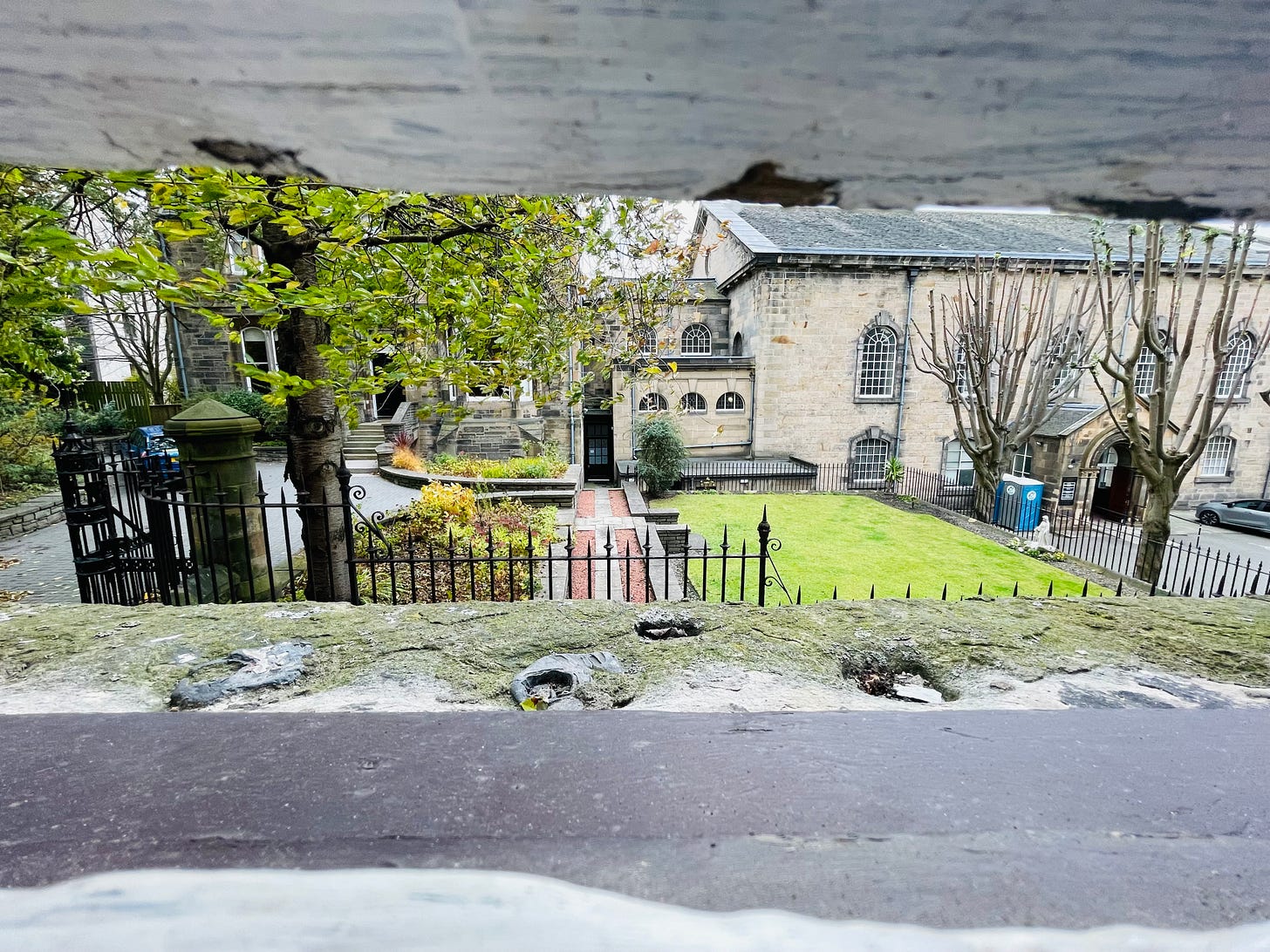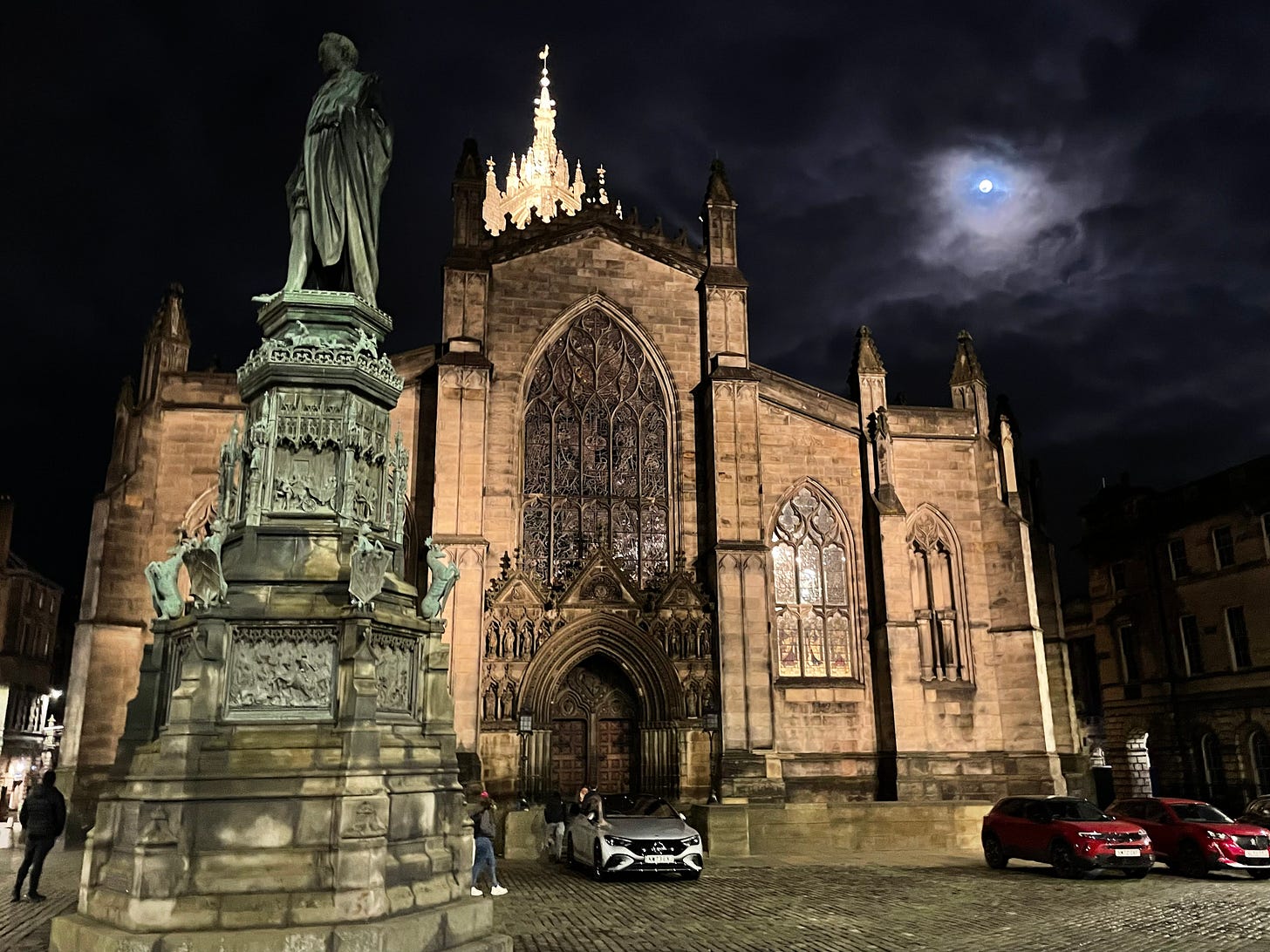I’m in Paris, as this is going out, to visit my daughter, who is studying there this semester. (I’ll try to post some pictures on Instagram while I’m there, if you’d like to follow.) So I wrote this last week. I hope you enjoy it! And I look forward to reading and responding to as many of your comments as I can.
This newsletter is free for all. Sign up, if you haven’t already, so you won’t miss a post.
The wind is howling today and blowing the half-yellowed leaves off the tree outside my window. The leaves are raining down like confetti, and soon they’ll be gone.
Strangely enough, though, I have the window cracked to let in a cool breeze. Through it I can hear someone rolling their suitcase along the cobblestones, making me think of what the wheels of a rolling carriage must have sounded like in this little lane. So I take a moment to notice what once was, what is passing, and what is still here.

Sometimes it feels impossible to explain my new life, this richer, deeper life that I have been creating for myself. But noticing is a big part of it. It’s hard to think, now, of how harried my life was before, and how little I noticed for so many years. Life was rushing past me. I had my head down and my nose to the grindstone. I couldn’t see much at all.
With noticing, I’ve realized, comes gratitude. I’m grateful for my eyes and ears and skin that help me sense this glorious world. (And that is no small thing as you feel one or more of those senses slipping away. For me, it’s my hearing, which is probably permanently impaired now in my left ear, thanks to Meniere’s, the autoimmune disorder that forced me to make big changes, slowing down my life.)
I’m also grateful to be here in Scotland, even as the days get shorter, and the temperatures cooler. In fact, with the night comes beautiful sights as well, such as the one below that I spied the other night on my way home from choir practice. I had to stop and take a picture—another form of noticing—even though I was walking and talking with someone. I asked him to stop so I could capture the shot, while he kept on talking and hardly seemed to notice. Well, he’s lived here all his life and has probably seen plenty of spooky moons over the grand architecture of the Old Town. But I haven’t. Which is why I’m here.
Yes, this is why I left home and traveled around Europe looking for a new place to land—so I could see better, and hear and smell and taste better, too. There have been quite a few pieces online lately about why moving to Europe won’t solve all your problems and how it’s difficult and expensive and probably not worth it. As the U.S. election nears, I understand why more and more people are gazing across the pond at what seems like greener grass.
I’ve been wanting to write something on the topic for a while, particularly as these pieces have criticized the whole Eat, Pray, Love craze and the latter day versions of it (including, I can’t help feeling, my little corner of Substack and the one that many of you inhabit as well as expats or expat-wannabes). I’ve wanted to say why I left home and headed overseas. There are many reasons. But one of them was, quite simply, to open me up to the world around me again.
You don’t need to leave home to open your senses and feel grateful to be alive. But traveling does help. I’ve written about that before, in fact.
What's the Use of Travel?
Audacious Women, Creative Lives is a newsletter sharing inspiring stories of women writers and artists. It is also a community supporting and inspiring women to live bold creative lives.
As I said there, travel is great for just plain ordinary renewal, but it’s also helpful for anyone who wants to write. Artists and writers are, at heart, those who notice—those on whom nothing is lost, as Henry James said. I went looking for the passage, and here it is, from “The Art of Fiction” (1915):
Experience . . . is an immense sensibility, a kind of huge spider-web, of the finest silken threads, suspended in the chamber of consciousness and catching every air-borne particle in its tissue. It is the very atmosphere of the mind; and when the mind is imaginative . . . it takes to itself the faintest hints of life, it converts the very pulses of the air into revelations. The young lady living in a village has only to be a damsel upon whom nothing is lost to make it quite unfair (as it seems to me) to declare to her that she shall have nothing to say about the military. Greater miracles have been seen than that, imagination assisting, she should speak the truth about some of these gentlemen.
I love so much about this quote. Let’s just pause for a moment on “convert[ing] the very pulses of the air into revelations.” It could be on paper or in your head, but the point is to notice and feel moved, to see the world tip on its axis just a bit, to feel changed by what your senses take in. Noticing as revelation!
I also love this quote because James is saying that who we are, where we live, and what opportunities we have for “experience” in the world are not the things that make us great writers. Going to war, even, is not sufficient experience. The experience that counts is what the mind observes and—more importantly—imagines itself into. He goes on to describe the process:
The power to guess the unseen from the seen, to trace the implication of things, to judge the whole piece by the pattern, the condition of feeling life, in general, so completely that you are well on your way to knowing any particular corner of it—this cluster of gifts may almost be said to constitute experience, and they occur in country and in town, and in the most differing stages of education.
He doesn’t mean that we should assume we know everything based on a glimpse, or that we should make leaps of judgment. Or I’d like to think he doesn’t. Let’s give him the benefit of the doubt and appreciate how he opens all of experience to the observant, imaginative mind, no matter who it belongs to, or where.
He writes further that experience consists of impressions, which are “the very air we breathe.” That is lovely as well. Noticing is like breathing. And just as we can slow down our breathing and become more mindful of it, so can we slow down and notice what is around us.
"Try to be one of the people on whom nothing is lost!" James says. It’s as good a mantra for anyone aspiring to mindfulness, literariness, or simply a richer, more creative life.
As always, I look forward to hearing your thoughts on any of this. Do you consciously try to pay attention to the small things around you? Do you slow down and listen or watch in ways that enrich your life? What are you noticing in your corner of the world today? What have you noticed recently that you wante to remember? Did you write it down or take a picture of it? What do you do with the things you notice? Is it important to you to capture them in some way? Or do you prefer to let them go?
See you in the comments!
—Anne
P.S. If you enjoyed this post, please click on the heart at the bottom or the top of this email/post. It helps others discover Audacious Women, Creative Lives. And makes me super happy!







On the face of it my world has narrowed recently because I quit my job in the summer to try and finish a book and launch a freelance career from pretty much nothing. I have savings, but they won’t last forever, so I’m trying to live as frugally as I can. I’ve never spent so much time at home! But recently I have started a practice of going out for a walk every morning for about an hour, and it is all about noticing. I go to the same place every day, which once upon a time I would have thought was really unimaginative, but now it feels like the opposite. I get to see how it changes every day in different weathers and different lights, and as the seasons gradually turn. Little things like dew on a cobweb, the sun shining through mist and the gradual thinning of the leaves on the trees. Also unsettling things like new leaf growth and nasturtiums flowering in October, because it has been so warm. But I feel more connected to the natural world than I have in a long time. The familiar becomes defamiliarised, because it is different every day (the other day it was so foggy I actually got lost). And now that I have more time than money, I’m looking to the natural world to help me with my Christmas presents - the last three days I’ve been picking and pressing autumn leaves (the colours are amazing this year, or perhaps it’s just that I’m paying more attention) and this afternoon I’m off in search of sloes. I feel so inspired to align my life more deeply to rhythms of the seasons.
Thank you, Anne, for this thought-provoking essay!
A great reminder of how important our attitude is in life. I try to consciously pay attention to the world by writing down my “notable firsts.” First time I see a monitor lizard. First time I stand on my head without wall support. First time I hold my new baby niece. Life is so rich when you pay attention.